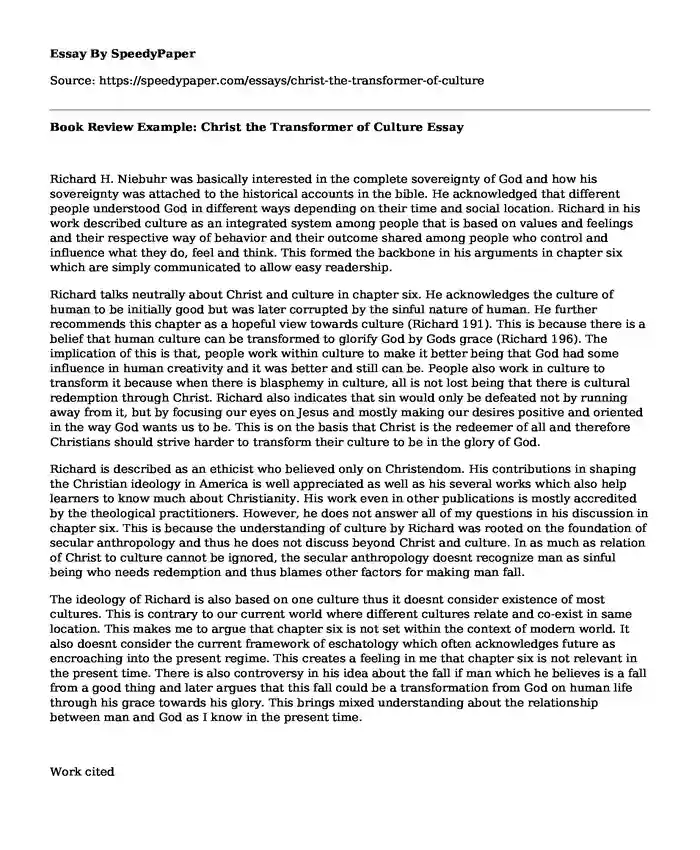
| Type of paper: | Essay |
| Categories: | Culture Christianity |
| Pages: | 3 |
| Wordcount: | 575 words |
Richard H. Niebuhr was basically interested in the complete sovereignty of God and how his sovereignty was attached to the historical accounts in the bible. He acknowledged that different people understood God in different ways depending on their time and social location. Richard in his work described culture as an integrated system among people that is based on values and feelings and their respective way of behavior and their outcome shared among people who control and influence what they do, feel and think. This formed the backbone in his arguments in chapter six which are simply communicated to allow easy readership.
Richard talks neutrally about Christ and culture in chapter six. He acknowledges the culture of human to be initially good but was later corrupted by the sinful nature of human. He further recommends this chapter as a hopeful view towards culture (Richard 191). This is because there is a belief that human culture can be transformed to glorify God by Gods grace (Richard 196). The implication of this is that, people work within culture to make it better being that God had some influence in human creativity and it was better and still can be. People also work in culture to transform it because when there is blasphemy in culture, all is not lost being that there is cultural redemption through Christ. Richard also indicates that sin would only be defeated not by running away from it, but by focusing our eyes on Jesus and mostly making our desires positive and oriented in the way God wants us to be. This is on the basis that Christ is the redeemer of all and therefore Christians should strive harder to transform their culture to be in the glory of God.
Richard is described as an ethicist who believed only on Christendom. His contributions in shaping the Christian ideology in America is well appreciated as well as his several works which also help learners to know much about Christianity. His work even in other publications is mostly accredited by the theological practitioners. However, he does not answer all of my questions in his discussion in chapter six. This is because the understanding of culture by Richard was rooted on the foundation of secular anthropology and thus he does not discuss beyond Christ and culture. In as much as relation of Christ to culture cannot be ignored, the secular anthropology doesnt recognize man as sinful being who needs redemption and thus blames other factors for making man fall.
The ideology of Richard is also based on one culture thus it doesnt consider existence of most cultures. This is contrary to our current world where different cultures relate and co-exist in same location. This makes me to argue that chapter six is not set within the context of modern world. It also doesnt consider the current framework of eschatology which often acknowledges future as encroaching into the present regime. This creates a feeling in me that chapter six is not relevant in the present time. There is also controversy in his idea about the fall if man which he believes is a fall from a good thing and later argues that this fall could be a transformation from God on human life through his grace towards his glory. This brings mixed understanding about the relationship between man and God as I know in the present time.
Work cited
Richard, Niebuhr. Christ and Culture. New Haven: Yale University Press, 1951.
Cite this page
Book Review Example: Christ the Transformer of Culture. (2019, Nov 18). Retrieved from https://speedypaper.net/essays/christ-the-transformer-of-culture
Request Removal
If you are the original author of this essay and no longer wish to have it published on the SpeedyPaper website, please click below to request its removal:
- Essay Sample for You: Louis Armstrong Life and Impact
- Yes, Schools Should Have Drug Screenings. Free Essay at SpeedyPaper
- Free Essay on the Criminology Theory: Agnew's General Strain
- Gun Laws in School - Essay Sample for You
- Free Essay Example -The Correlates of Divorce
- Free Essay Example. Job Process
- Paper Example. Correctional Support
Popular categories




